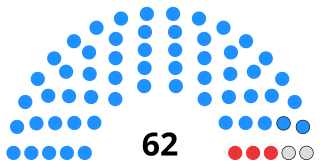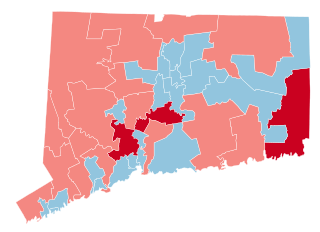The politics of Cambodia are defined within the framework of a constitutional monarchy, in which the king serves as the head of state, and the prime minister is the head of government. In practice, Cambodia is an authoritarian state, as power is centralized in the hands of the Cambodian People’s Party (CPP) under long-standing leader Hun Sen. Civil society groups, independent media and opposition parties are repressed, and elections are not free and fair.

The Cambodian People's Party (CPP) is a Cambodian political party which has ruled the country since 1979. Founded in 1951, it was originally known as the Kampuchean People's Revolutionary Party (KPRP).

The 1920 United States Senate elections were elections for the United States Senate that coincided with the presidential election of Warren G. Harding. The 32 seats of Class 3 were contested in regular elections, and special elections were held to fill vacancies. Democrat Woodrow Wilson's unpopularity allowed Republicans to win races across the country, winning ten seats from the Democrats and providing them with an overwhelming 59-to-37 majority. The Republican landslide was so vast that Democrats lost over half of the contested seats this year and failed to win a single race outside the South. In fact, this is the most recent occasion where every race decided by under 10 points all voted for the same party, showcasing the sheer strength of Republicans' performance in this election.

The Senate is the upper house of the Parliament of Cambodia. It is a legislative body composed of 62 members. 58 of the Senate seats are elected every six years by the commune councillors from 24 provinces of Cambodia and members of the National Assembly. In addition, the King nominates two senators, and the National Assembly nominates two, ending with a total of 62 senators. The Senate performs its duties as determined in the constitution and law in force. The Senate is chaired and presided by the president, currently Hun Sen of the Cambodian People's Party and assisted by two Vice Presidents.
A senatorial election was held on November 12, 1963 in the Philippines. The 1963 elections were known as a midterm election as the date when the elected officials take office falls halfway through President Diosdado Macapagal's four-year term.

There are 1,646 communes (khums/sangkats) in Cambodia. Each Commune Council is composed of 5 to 11 members depending on demography and geography, elected through a proportional system where nationally registered political parties can compete by presenting a list of candidates of at least twice the number of seats in each Commune. There are no independent candidates. Commune councillors vote on their constituents' behalf in Senate elections. As such, a victory in communal elections would all but guarantee a majority in the Senate.

California's state elections were held on November 5, 2002. Necessary primary elections were held on March 5. Up for election were all the seats of the California State Assembly, 20 seats of the California Senate, seven constitutional officers, all the seats of the California Board of Equalization, as well as votes on retention of two Supreme Court justices and various appeals court judges. Seven ballot measures were also up for approval. Municipal offices were also included in the election.

The 2012 United States elections took place on November 6, 2012. Democratic President Barack Obama won reelection to a second term and the Democrats gained seats in both chambers of Congress, retaining control of the Senate even though the Republican Party retained control of the House of Representatives. As of 2024, this is the most recent election cycle in which neither the presidency nor a chamber of Congress changed partisan control, and the last time that the party that won the presidency simultaneously gained seats in both the House of Representatives and the Senate.

The 1856–57 United States Senate elections were held on various dates in various states. As these U.S. Senate elections were prior to the ratification of the Seventeenth Amendment in 1913, senators were chosen by state legislatures. Senators were elected over a wide range of time throughout 1856 and 1857, and a seat may have been filled months late or remained vacant due to legislative deadlock. In these elections, terms were up for the senators in Class 1.

The 1868–69 United States Senate elections were held on various dates in various states. As these U.S. Senate elections were prior to the ratification of the Seventeenth Amendment in 1913, senators were chosen by state legislatures. Senators were elected over a wide range of time throughout 1868 and 1869, and a seat may have been filled months late or remained vacant due to legislative deadlock. In these elections, terms were up for the senators in Class 1.

The 1904–05 United States Senate elections were held on various dates in various states, coinciding with President Theodore Roosevelt's landslide election to a full term and the 1904 House of Representatives elections. As these U.S. Senate elections were prior to the ratification of the Seventeenth Amendment in 1913, senators were chosen by state legislatures. Senators were elected over a wide range of time throughout 1904 and 1905, and a seat may have been filled months late or remained vacant due to legislative deadlock. In these elections, terms were up for the senators in Class 1.

The 2010 Wisconsin Fall General Election was held in the U.S. state of Wisconsin on November 2, 2010. All of Wisconsin's executive and administrative officers were up for election as well as one of Wisconsin's U.S. Senate seats, Wisconsin's eight seats in the United States House of Representatives, seventeen seats in the Wisconsin State Senate, and all 99 seats in the Wisconsin State Assembly. The 2010 Wisconsin Fall Partisan Primary was held September 14, 2010.

The 1860–61 United States Senate elections were held on various dates in various states. As these U.S. Senate elections were prior to the ratification of the Seventeenth Amendment in 1913, senators were chosen by state legislatures. Senators were elected over a wide range of time throughout 1860 and 1861, and a seat may have been filled months late or remained vacant due to legislative deadlock. In these elections, terms were up for the senators in Class 3.

Vermont's 2012 general elections were held on November 6, 2012. Primary elections were held on August 28, 2012.

The 2018 United States Senate elections were held on November 6, 2018. Among the 100 seats, the 33 of Class 1 were contested in regular elections while 2 others were contested in special elections due to Senate vacancies in Minnesota and Mississippi. The regular election winners were elected to 6-year terms running from January 3, 2019, to January 3, 2025. Senate Democrats had 26 seats up for election, while Senate Republicans had 9 seats up for election.
A general election was held in the U.S. state of Minnesota on November 8, 2016. All seats in the Minnesota Senate and Minnesota House of Representatives were up for election as well as Minnesota's 10 presidential electors and Minnesota's eight seats in the United States House of Representatives. A primary election was held on August 9, 2016.

Senate elections were held in Cambodia on 22 January 2006 to elect 57 of the 61 Senators of Cambodia. The result was a victory for the Cambodian People's Party which won 45 seats. The FUNCINPEC Party won 10 seats, and the Sam Rainsy Party won 2 seats. This is the first Senate election in Cambodia since previous Senators were appointed by Parliament and the King.
Senate elections were held in Cambodia on 25 February 2018 after being postponed from 14 January 2018. For the first time, the Senate and parliamentary elections occurred in the same year. The result was a victory for the CPP, which won all 58 seats. King Norodom Sihamoni nominated Princess Norodom Arunrasmy and Oum Somanin to the Senate.
Events in the year 2018 in Cambodia.

The 2016 Connecticut Senate election was held on November 8, 2016, concurrently with the elections for the Connecticut House of Representatives, to elect members to the Connecticut General Assembly. All 36 seats in the Connecticut Senate were up for election. The election resulted in a tie, with the parties controlling 18 seats each. Primary elections were held on August 9, 2016.

















